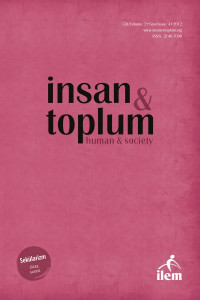Öz
İkinci Dünya Savaşı sonrasında önemi giderek artmış olan demokrasi kavramı ve din-devlet ilişkileri akademik çevrelerin önemli ölçüde dikkatini çekmektedir. Bilindiği üzere, demokratik niteliğe sahip siyasal sistemlerde, vatandaşların hukuk önünde eşit olması ve fırsat eşitliğine sahip olmaları gibi konular önemli bir yer tutmaktadır. Bu bağlamda, çoğu laik devletin, vatandaşlarının dini tercihlerine karışmaması noktasında demokratik bir karakter taşıdığı ileri sürülebilir. Buna karşın; dinin üstünde devlet denetimi anlamı taşıyan bir laiklik yorumu da mevcuttur. Bu bakımdan, Türkiye, laiklik-demokrasi ilişkisinde devlet kurumunun din üstündeki baskın rolüne ışık tutan bir örneği temsil etmektedir. Bu çalışma, Türkiye bağlamında, devletin laiklik yorumu ve laiklik pratiğinin, demokrasiye olan olumsuz etkilerini ele almaya çalışacaktır
Anahtar Kelimeler
Türkiye Modernleşme Laiklik Laisite Demokrasi Kemalist Elitism
Kaynakça
- Küçükcan, T. (2003). State, Islam, and religious liberty in modern Turkey: Reconfiguration of religion in the Public Sphere. Brigham Young University Law Review, 1, 470-497.
- Kuru, A. (2007). Passive and assertive secularism: Historical conditions, ideological struggles, and state policies toward religion. World Politics, 59(4), 568-594.
- Locke, J. (1689). An essay concerning human understanding (revised editions: 1694-1700). London: Wlliam Tegg.
- Mill, J. S. (1859). On liberty. London: J. W. Parker and Son.
- Narlı, N. (1999). The rise of the Islamist movement in Turkey. Middle East Review of International Affairs, 3(3), 38-48.
- Raz, J. (1986). The morality of freedom. Oxford: Clarendon Press.
Öz
The concept of democracy that has gained importance since the end of the Second World War and the relation between state and religion in Turkey have attracted a considerable degree of interest in various academic circles. It is known that in democratic systems, equality before the law and equality of opportunities for all individuals are regarded as integral elements. In this context, although it may be argued that many states that have a secular system are actually democratic in terms of their non-intervention in the religious choices of its citizens, it is also known that there is another interpretation of secularism in which the state exercises control over religion. The Turkish case represents a unique example in the study of the relationship between secularism and democracy with regard to the dominant role of the state in religious affairs. This study will attempt to analyze the negative impact of the state’s interpretation of secularism on democracy in Turkey.
Anahtar Kelimeler
Turkey Modernization Secularism Laicism Democracy Kemalist Elitism
Kaynakça
- Küçükcan, T. (2003). State, Islam, and religious liberty in modern Turkey: Reconfiguration of religion in the Public Sphere. Brigham Young University Law Review, 1, 470-497.
- Kuru, A. (2007). Passive and assertive secularism: Historical conditions, ideological struggles, and state policies toward religion. World Politics, 59(4), 568-594.
- Locke, J. (1689). An essay concerning human understanding (revised editions: 1694-1700). London: Wlliam Tegg.
- Mill, J. S. (1859). On liberty. London: J. W. Parker and Son.
- Narlı, N. (1999). The rise of the Islamist movement in Turkey. Middle East Review of International Affairs, 3(3), 38-48.
- Raz, J. (1986). The morality of freedom. Oxford: Clarendon Press.
Ayrıntılar
| Birincil Dil | İngilizce |
|---|---|
| Konular | Sosyoloji |
| Bölüm | Araştırma Makaleleri |
| Yazarlar | |
| Yayımlanma Tarihi | 1 Aralık 2012 |
| Yayımlandığı Sayı | Yıl 2012 Cilt: 2 Sayı: 4 |


